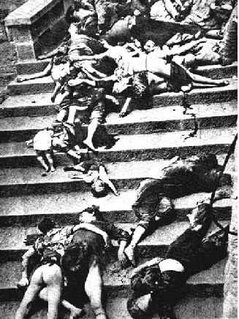November 29, 2006
 Towards the south end of Nanjing, China stands one of the many causes of tension between China and Japan: the Nanjing Massacre Museum. This memorial was erected on a mass grave (skeletons in situ are part of the exhibit) where Japanese soldiers buried the 100,000 (conservative) to 300,000 (Chinese gov't numbers) Chinese who were killed between December 13, 1937 and February 1938 as Japan occupied the capital of China. It would seem that Iris Chang's painstakingly researched Rape of Nanking (Penguin, 1998) would be enough for post-WWII Japan to recognize atrocities committed by a prior generation in a war full of atrocities on all sides. But the government in Japan continues to allow school districts to adopt history textbooks that rather than omit any mention of the Rape of Nanjing-- which would be bad enough-- flat out deny that it ever happened.
Towards the south end of Nanjing, China stands one of the many causes of tension between China and Japan: the Nanjing Massacre Museum. This memorial was erected on a mass grave (skeletons in situ are part of the exhibit) where Japanese soldiers buried the 100,000 (conservative) to 300,000 (Chinese gov't numbers) Chinese who were killed between December 13, 1937 and February 1938 as Japan occupied the capital of China. It would seem that Iris Chang's painstakingly researched Rape of Nanking (Penguin, 1998) would be enough for post-WWII Japan to recognize atrocities committed by a prior generation in a war full of atrocities on all sides. But the government in Japan continues to allow school districts to adopt history textbooks that rather than omit any mention of the Rape of Nanjing-- which would be bad enough-- flat out deny that it ever happened. I visited the memorial with another foreign coworker [ie, not Chinese] at the Chinese Uni where I was teaching. We were both appalled at the curatorial model that the museum follows. About every five feet, there is a plaque in Chinese and English--Chinglish really, but it's an honest effort--that seems to fall back on the Party model of making sure to tell everyone how they should feel, as if seeing a mass grave somehow wouldn't stir the mind enough to draw the conclusion that what happened here was an outrage. There were lines in the museum text like (I'm using memory here, so not verbatim) "How can you bear to see such atrocities!!!" & "Imagine how you would feel in the face of such outrage and shame!!!" The plaques really lessened the impact of the devastation, as saying nothing and letting the viewer take in the scene would have had a far deeper impact. This museum should have the same impact as the Ossuary of Douamont which memorializes the frontline of WWI Verdun, using the bones of some 130,000 unknown soldiers stacked on top of each other to make it's point; outside there's a cememtary with 15,000 crosses. Both force the viewer to consider the human consequences of war.


0 Comments:
Post a Comment
<< Home